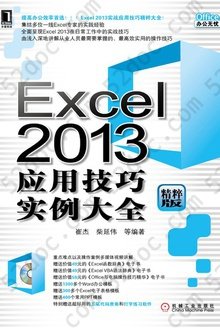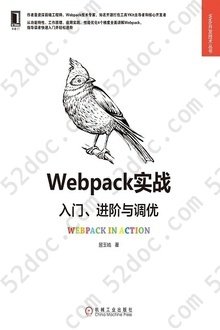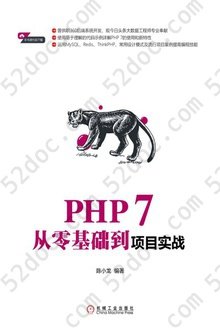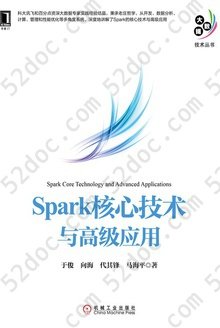注重体验与质量的电子书资源下载网站
分类于: 设计 其它
简介
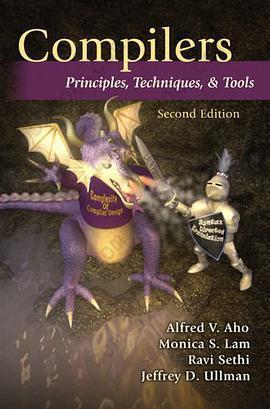
Compilers: Principles, Techniques, and Tools 豆 8.7分
资源最后更新于 2020-09-10 15:15:51
作者:Alfred V. Aho
出版社:Addison Wesley
出版日期:2006-01
ISBN:9780321486813
文件格式: pdf
标签: 编译原理 compiler 计算机科学 计算机 编译器 compilers 编程 Compiler
简介· · · · · ·
This book provides the foundation for understanding the theory and pracitce of compilers. Revised and updated, it reflects the current state of compilation. Every chapter has been completely revised to reflect developments in software engineering, programming languages, and computer architecture that have occurred since 1986, when the last edition published. The authors, reco...
目录
1 Introduction
1.1 Language Processors
1.2 The Structure of a Compiler
1.3 The Evolution of Programming Languages
1.4 The Science of Building a Compiler
1.5 Applications of Compiler Technology
1.6 Programming Language Basics
1.7 Summary of Chapter 1
1.8 References for Chapter 1
2 A Simple Syntax-Directed Translator
2.1 Introduction
2.2 Syntax Definition
2.3 Syntax-Directed Translation
2.4 Parsing
2.5 A Translator for Simple Expressions
2.6 Lexical Analysis
2.7 Symbol Tables
2.8 Intermediate Code Generation
2.9 Summary of Chapter 2
3 Lexical Analysis
3.1 The Role of the Lexical Analyzer
3.2 Input Buffering
3.3 Specification of Tokens
3.4 Recognition of Tokens
3.5 The Lexical-Analyzer Generator Lex
3.6 Finite Automata
3.7 From Regular Expressions to Automata
3.8 Design of a Lexical-Analyzer Generator
3.9 Optimization of DFA-Based Pattern Matchers
3.10 Summary of Chapter 3
3.11 References for Chapter 3
4 Syntax Analysis
4.1 Introduction
4.2 Context-Free Grammars
4.3 Writing a Grammar
4.4 Top-Down Parsing
4.5 Bottom-Up Parsing
4.6 Introduction to LR Parsing: Simple LR
4.7 More Powerful LR Parsers
4.8 Using Ambiguous Grammars
4.9 Parser Generators
4.10 Summary of Chapter 4
4.11 References for Chapter 4
5 Syntax-Directed Translation
5.1 Syntax-Directed Definitions
5.2 Evaluation Orders for SDD's
5.3 Applications of Syntax-Directed Translation
5.4 Syntax-Directed Translation Schemes
5.5 Implementing L-Attributed SDD's
5.6 Summary of Chapter 5
5.7 References for Chapter 5
6 Intermediate-Code Generation
6.1 Variants of Syntax Trees
6.2 Three-Address Code
6.3 Types and Declarations
6.4 Translation of Expressions
6.5 Type Checking
6.6 Control Flow
6.7 Backpatching
6.8 Switch-Statements
6.9 Intermediate Code for Procedures
6.10 Summary of Chapter 6
6.11 References for Chapter 6
7 Run-Time Environments
7.1 Storage Organization
7.2 Stack Allocation of Space
7.3 Access to Nonlocal Data on the Stack
7.4 Heap Management
7.5 Introduction to Garbage Collection
7.6 Introduction to Trace-Based Collection
7.7 Short-Pause Garbage Collection
7.8 Advanced Topics in Garbage Collection
7.9 Summary of Chapter 7
7.10 References for Chapter 7
8 Code Generation
8.1 Issues in the Design of a Code Generator
8.2 The Target Language
8.3 Addresses in the Target Code
8.4 Basic Blocks and Flow Graphs
8.5 Optimization of Basic Blocks
8.6 A Simple Code Generator
8.7 Peephole Optimization
8.8 Register Allocation and Assignment
8.9 Instruction Selection by Tree Rewriting
8.10 Optimal Code Generation for Expressions
8.11 Dynamic Programming Code-Generation
8.12 Summary of Chapter 8
8.13 References for Chapter 8
9 Machine-Independent Optimizations
9.1 The Principal Sources of Optimization
9.2 Introduction to Data-Flow Analysis
9.3 Foundations of Data-Flow Analysis
9.4 Constant Propagation
9.5 Partial-Redundancy Elimination
9.6 Loops in Flow Graphs
9.7 Region-Based Analysis
9.8 Symbolic Analysis
9.9 Summary of Chapter 9
9.10 References for Chapter 9
10 Instruction-Level Parallelism
10.1 Processor Architectures
10.2 Code-Scheduling Constraints
10.3 Basic-Block Scheduling
10.4 Global Code Scheduling
10.5 Software Pipelining
10.6 Summary of Chapter 10
10.7 References for Chapter 10
11 Optimizing for Parallelism and Locality
11.1 Basic Concepts
11.2 Matrix Multiply: An In-Depth Example
11.3 Iteration Spaces
11.4 Affine Array Indexes
11.5 Data Reuse
11.6 Array Data-Dependence Analysis
11.7 Finding Synchronization-Free Parallelism
11.8 Synchronization Between Parallel Loops
11.9 Pipelining
11.10 Locality Optimizations
11.11 Other Uses of Affine Transforms
11.12 Summary of Chapter 11
11.13 References for Chapter 11
12 Interprocedural Analysis
12.1 Basic Concepts
12.2 Why Interprocedural Analysis?
12.3 A Logical Representation of Data Flow
12.4 A Simple Pointer-Analysis Algorithm
12.5 Context-Insensitive Interprocedural Analysis
12.6 Context-Sensitive Pointer Analysis
12.7 Datalog Implementation by BDD's
12.8 Summary of Chapter 12
12.9 References for Chapter 12
A A Complete Front End
A.1 The Source Language
A.2 Main
A.3 Lexical Analyzer
A.4 Symbol Tables and Types
A.5 Intermediate Code for Expressions
A.6 Jumping Code for Boolean Expressions
A.7 Intermediate Code for Statements
A.8 Parser
A.9 Creating the Front End
B Finding Linearly Independent Solutions
Index
1.1 Language Processors
1.2 The Structure of a Compiler
1.3 The Evolution of Programming Languages
1.4 The Science of Building a Compiler
1.5 Applications of Compiler Technology
1.6 Programming Language Basics
1.7 Summary of Chapter 1
1.8 References for Chapter 1
2 A Simple Syntax-Directed Translator
2.1 Introduction
2.2 Syntax Definition
2.3 Syntax-Directed Translation
2.4 Parsing
2.5 A Translator for Simple Expressions
2.6 Lexical Analysis
2.7 Symbol Tables
2.8 Intermediate Code Generation
2.9 Summary of Chapter 2
3 Lexical Analysis
3.1 The Role of the Lexical Analyzer
3.2 Input Buffering
3.3 Specification of Tokens
3.4 Recognition of Tokens
3.5 The Lexical-Analyzer Generator Lex
3.6 Finite Automata
3.7 From Regular Expressions to Automata
3.8 Design of a Lexical-Analyzer Generator
3.9 Optimization of DFA-Based Pattern Matchers
3.10 Summary of Chapter 3
3.11 References for Chapter 3
4 Syntax Analysis
4.1 Introduction
4.2 Context-Free Grammars
4.3 Writing a Grammar
4.4 Top-Down Parsing
4.5 Bottom-Up Parsing
4.6 Introduction to LR Parsing: Simple LR
4.7 More Powerful LR Parsers
4.8 Using Ambiguous Grammars
4.9 Parser Generators
4.10 Summary of Chapter 4
4.11 References for Chapter 4
5 Syntax-Directed Translation
5.1 Syntax-Directed Definitions
5.2 Evaluation Orders for SDD's
5.3 Applications of Syntax-Directed Translation
5.4 Syntax-Directed Translation Schemes
5.5 Implementing L-Attributed SDD's
5.6 Summary of Chapter 5
5.7 References for Chapter 5
6 Intermediate-Code Generation
6.1 Variants of Syntax Trees
6.2 Three-Address Code
6.3 Types and Declarations
6.4 Translation of Expressions
6.5 Type Checking
6.6 Control Flow
6.7 Backpatching
6.8 Switch-Statements
6.9 Intermediate Code for Procedures
6.10 Summary of Chapter 6
6.11 References for Chapter 6
7 Run-Time Environments
7.1 Storage Organization
7.2 Stack Allocation of Space
7.3 Access to Nonlocal Data on the Stack
7.4 Heap Management
7.5 Introduction to Garbage Collection
7.6 Introduction to Trace-Based Collection
7.7 Short-Pause Garbage Collection
7.8 Advanced Topics in Garbage Collection
7.9 Summary of Chapter 7
7.10 References for Chapter 7
8 Code Generation
8.1 Issues in the Design of a Code Generator
8.2 The Target Language
8.3 Addresses in the Target Code
8.4 Basic Blocks and Flow Graphs
8.5 Optimization of Basic Blocks
8.6 A Simple Code Generator
8.7 Peephole Optimization
8.8 Register Allocation and Assignment
8.9 Instruction Selection by Tree Rewriting
8.10 Optimal Code Generation for Expressions
8.11 Dynamic Programming Code-Generation
8.12 Summary of Chapter 8
8.13 References for Chapter 8
9 Machine-Independent Optimizations
9.1 The Principal Sources of Optimization
9.2 Introduction to Data-Flow Analysis
9.3 Foundations of Data-Flow Analysis
9.4 Constant Propagation
9.5 Partial-Redundancy Elimination
9.6 Loops in Flow Graphs
9.7 Region-Based Analysis
9.8 Symbolic Analysis
9.9 Summary of Chapter 9
9.10 References for Chapter 9
10 Instruction-Level Parallelism
10.1 Processor Architectures
10.2 Code-Scheduling Constraints
10.3 Basic-Block Scheduling
10.4 Global Code Scheduling
10.5 Software Pipelining
10.6 Summary of Chapter 10
10.7 References for Chapter 10
11 Optimizing for Parallelism and Locality
11.1 Basic Concepts
11.2 Matrix Multiply: An In-Depth Example
11.3 Iteration Spaces
11.4 Affine Array Indexes
11.5 Data Reuse
11.6 Array Data-Dependence Analysis
11.7 Finding Synchronization-Free Parallelism
11.8 Synchronization Between Parallel Loops
11.9 Pipelining
11.10 Locality Optimizations
11.11 Other Uses of Affine Transforms
11.12 Summary of Chapter 11
11.13 References for Chapter 11
12 Interprocedural Analysis
12.1 Basic Concepts
12.2 Why Interprocedural Analysis?
12.3 A Logical Representation of Data Flow
12.4 A Simple Pointer-Analysis Algorithm
12.5 Context-Insensitive Interprocedural Analysis
12.6 Context-Sensitive Pointer Analysis
12.7 Datalog Implementation by BDD's
12.8 Summary of Chapter 12
12.9 References for Chapter 12
A A Complete Front End
A.1 The Source Language
A.2 Main
A.3 Lexical Analyzer
A.4 Symbol Tables and Types
A.5 Intermediate Code for Expressions
A.6 Jumping Code for Boolean Expressions
A.7 Intermediate Code for Statements
A.8 Parser
A.9 Creating the Front End
B Finding Linearly Independent Solutions
Index



